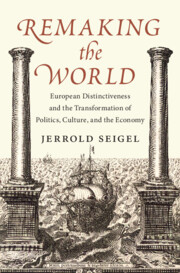 Remaking the World
Remaking the World France and Germany
from Part IV - Making Industry Modern
Published online by Cambridge University Press: 29 November 2024
Although France and Germany would acquire modern industrial economies after 1850, neither was in a position to do so even a few decades earlier. Only the coming of railroads would give either country the kind of national market that was so important in Britain. The same was true for science in France, but not in Germany, for reasons that had to do with the same fragmentation that kept its economy traditional. The impact of railroad construction made up for that absence in making economic transformation possible, so that organizing spheres in accord with principles derived from the activities carried on within them would come as a concomitant of industrial transformation rather than a precondition for it. Its most striking expression would be the organization of national professional organizations, dedicated to giving doctors, engineers, chemists, and academic researchers control over their own domains, and providing essential services for modern industrial societies.
To save this book to your Kindle, first ensure no-reply@cambridge.org is added to your Approved Personal Document E-mail List under your Personal Document Settings on the Manage Your Content and Devices page of your Amazon account. Then enter the ‘name’ part of your Kindle email address below. Find out more about saving to your Kindle.
Note you can select to save to either the @free.kindle.com or @kindle.com variations. ‘@free.kindle.com’ emails are free but can only be saved to your device when it is connected to wi-fi. ‘@kindle.com’ emails can be delivered even when you are not connected to wi-fi, but note that service fees apply.
Find out more about the Kindle Personal Document Service.
To save content items to your account, please confirm that you agree to abide by our usage policies. If this is the first time you use this feature, you will be asked to authorise Cambridge Core to connect with your account. Find out more about saving content to Dropbox.
To save content items to your account, please confirm that you agree to abide by our usage policies. If this is the first time you use this feature, you will be asked to authorise Cambridge Core to connect with your account. Find out more about saving content to Google Drive.